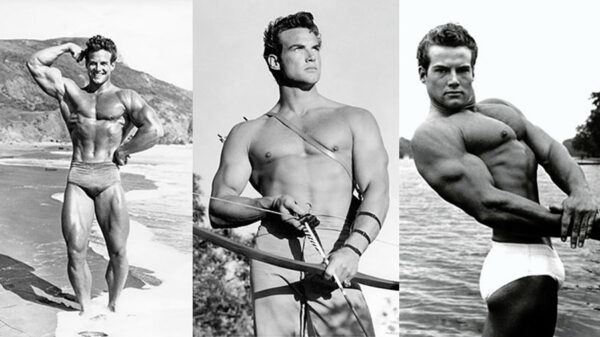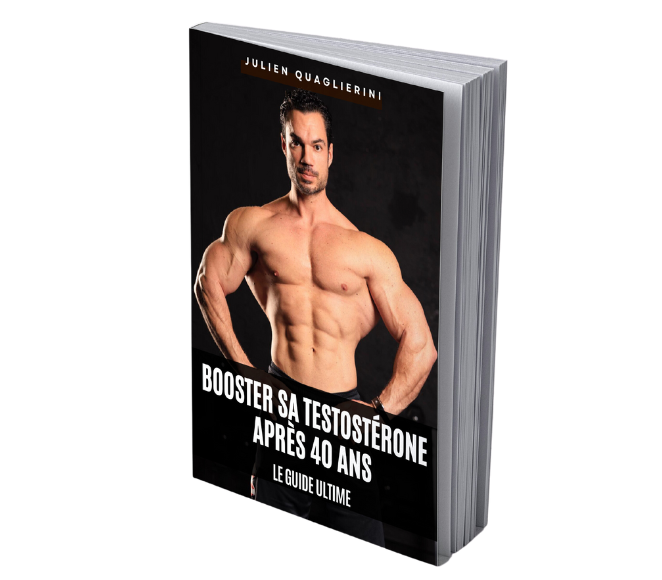Peut-on faire de la musculation après 40 ans ? Si vous en doutiez encore, la réponse est oui. En revanche, vous le savez, le corps change avec l’âge. Les niveaux de testostérone baissent et la croissance musculaire devient plus difficile, au contraire de la prise de gras. 😢 Mais alors, est-il impossible d’atteindre vos objectifs ?
Dans cet article, vous verrez qu’en adoptant le bon programme sportif et en soignant votre hygiène de vie, il est tout à fait possible de construire du muscle même après 40 ans ! 💪
Se muscler après 40 ans, en bref :
- Se muscler après 40 ans est possible, malgré la baisse de testostérone.
- Un bon programme d’entraînement et une hygiène de vie adaptée permettent de prendre du muscle à tout âge.
- L’échauffement est indispensable pour éviter les blessures.
- Il est préférable d’augmenter le nombre de répétitions et de limiter les charges trop lourdes.
- La technique d’exécution doit être irréprochable pour protéger les articulations et les tendons.
- Le cardio est essentiel pour préserver la santé cardiovasculaire.
Sommaire
Pourquoi est-il plus difficile de prendre du muscle après 40 ans ?
Passé la quarantaine, le corps humain doit faire face à de profonds changements physiologiques. À ce titre, s’entraîner après 40 ans n’a rien à voir avec l’entraînement d’un homme de 20 ans, quelle que soit l’activité sportive pratiquée.
En effet, le vieillissement entraîne une baisse des hormones naturelles, qu’il s’agisse du taux de testostérone – de l’ordre de 1 % par an à partir de l’âge de 30 ans1 – ou d’hormone de croissance.
Le schéma ci-dessous illustre ce phénomène naturel. Entre 18 et 30 ans, c’est la période durant laquelle les hommes produisent le plus de testostérone. C’est donc le moment idéal pour la prise de masse musculaire.
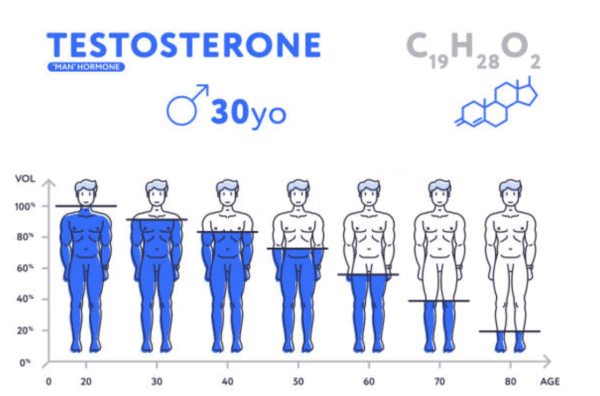
Après cet âge, les taux d’hormones chutent. 📉 La régénération de la synthèse des protéines vers le muscle sera plus longue. La prise de muscle devient progressivement plus difficile. Mais difficile ne veut pas dire impossible ! La preuve avec ces élèves de la team qui sont parvenus à améliorer leur physique, même après 40 ans.
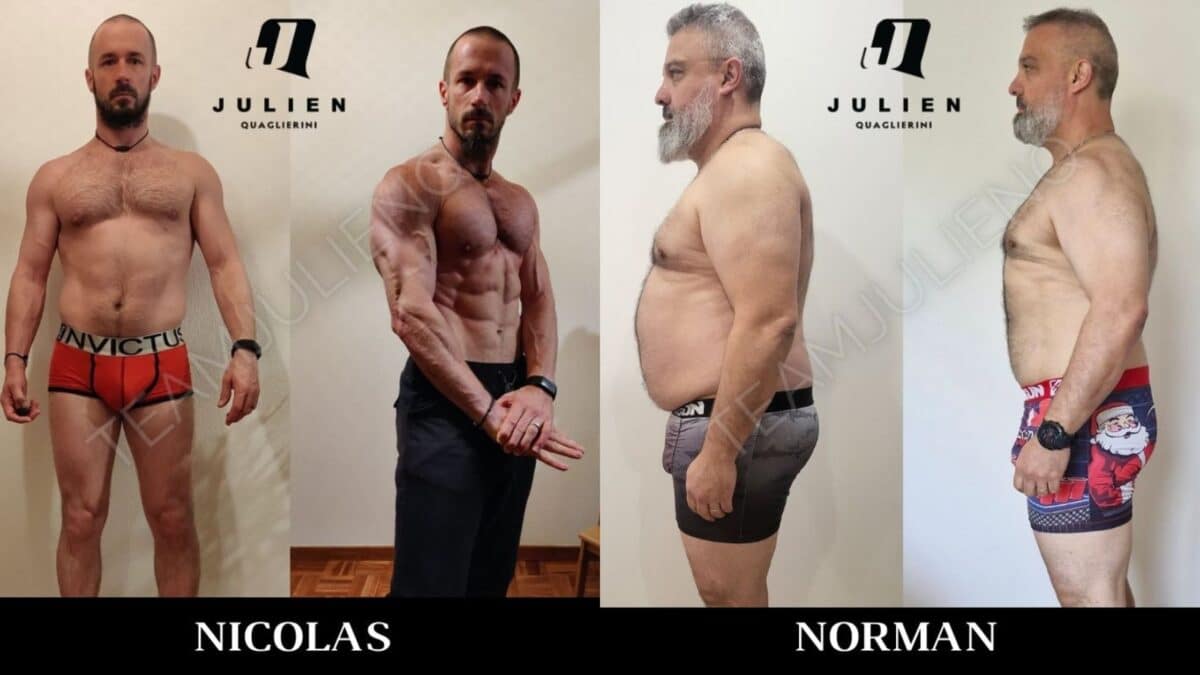
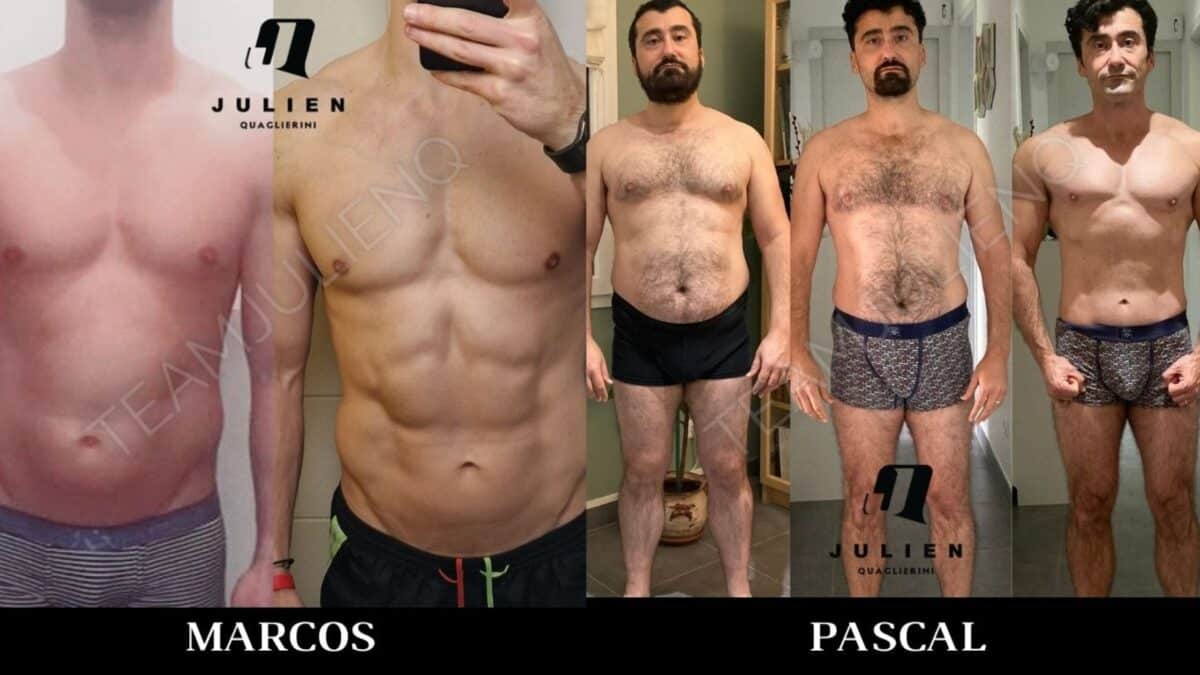
Il en est de même pour la perte de poids et la récupération physique. Si, à 20 ans, vous n’aviez pas de mal à récupérer d’un écart alimentaire 🍟 ou d’une soirée, ce n’est plus la même histoire à 40 ans.
Chez les hommes, le stockage du gras se fait plutôt au niveau de la ceinture abdominale, laissant apparaître les fameuses poignées d’amour. Chez les femmes, le constat est identique, si ce n’est que la graisse sera plutôt localisée sur les fesses et sur les hanches.
En résumé, passé un certain âge, le métabolisme ralentit. Prendre du muscle, perdre du poids et bien récupérer après un effort deviennent alors des tâches plus ardues. 😤

Si vous ne pratiquez aucune activité physique, cela peut avoir un impact encore plus négatif sur votre corps et votre santé en général.
Pour entamer une transformation physique à 40 ans ou plus, vous devrez donc porter une attention toute particulière aux 3 piliers ci-dessous :
- L’entraînement de musculation 🏋️
- La nutrition 🥗
- L’hygiène de vie 😴
Voyons cela plus en détail.
5 conseils pour se muscler à 40 ans
Passé 40 ans, vous devez absolument adapter votre programme d’entraînement et prendre certaines précautions que vous ne preniez pas auparavant.

Prenez le temps de vous échauffer
Après un certain âge, tout pratiquant de musculation devient plus sujet aux blessures. 🚑
C’est pourquoi il est d’autant plus important de bien s’échauffer avant chaque séance. Je vous explique comment dans cet article détaillé.
Optez pour un échauffement musculaire et articulaire d’une quinzaine de minutes avant de soulever des poids. Vous pouvez commencer par utiliser un appareil de cardio (vélo, rameur, etc.), avant de passer à des échauffements ciblés des muscles sollicités durant le training.
Cela augmentera la température de votre corps et favorise le flux sanguin.
Par ailleurs, avant chacun des exercices de base qui composent votre entraînement (développé couché, développé militaire, squat, etc.), pensez à effectuer une première série avec de faibles charges.
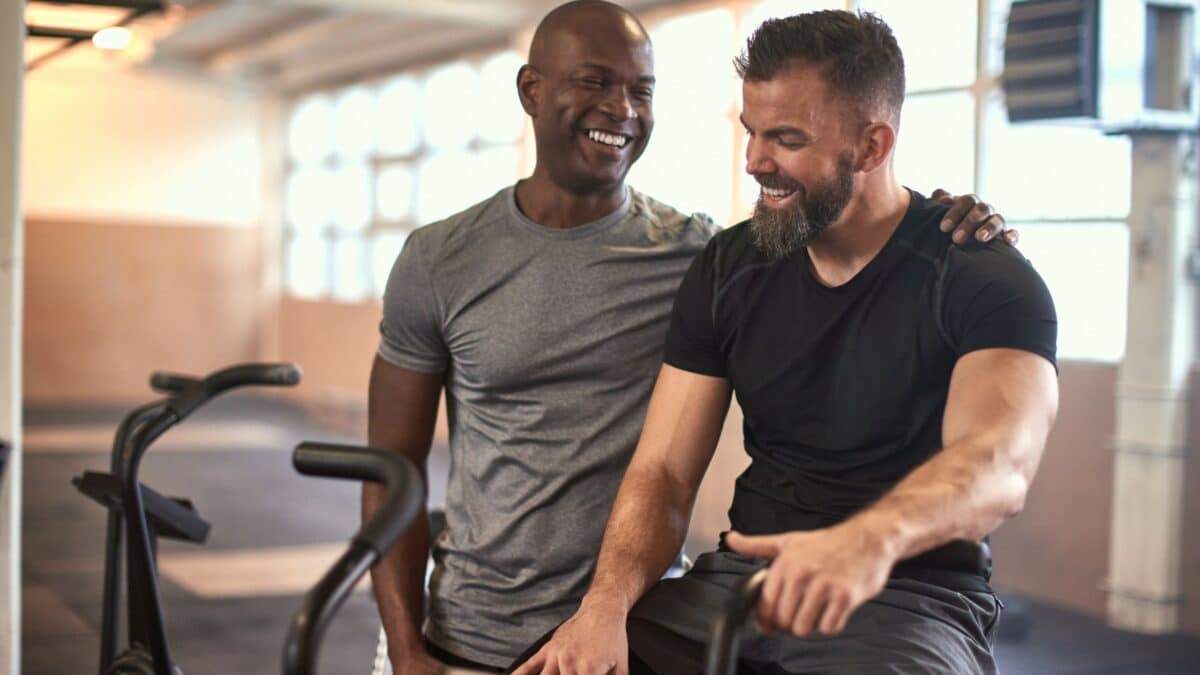
Augmentez le nombre de répétitions
Faire de la musculation à 40 ans implique de repenser l’organisation de vos séances à la salle de sport.
Vos articulations et vos ligaments deviennent plus fragiles. Il est alors déconseillé de travailler avec des poids trop lourds. ❌
À l’inverse, privilégiez des charges plus légères, avec un nombre de répétitions plus élevé :
- De 8 à 12 répétitions pour le haut du corps
- De 12 à 20 répétitions pour le bas du corps
Cela vous permettra de sculpter vos muscles, sans mettre trop de stress et de contraintes sur vos articulations. Vous éviterez ainsi de vous blesser.
Vous pouvez aussi utiliser des techniques d’intensification comme le temps sous tension pour optimiser votre développement musculaire.
Soignez la technique d’exécution
Que vous ayez 20, 40 ou 60 ans, votre technique d’exécution des exercices et votre posture doivent être parfaites.
C’est encore plus vrai en prenant de l’âge, car votre corps n’a plus la même force. Adopter une mauvaise position peut facilement entraîner des blessures.
Associez les poids libres et les appareils de musculation
Pour gagner du muscle, utilisez une combinaison de poids libres et de machines. 🤝
Chez les jeunes pratiquants, le corps est capable de travailler exclusivement avec des poids. Mais à mesure que vous vieillissez, vos muscles stabilisateurs commencent à s’affaiblir. Cela a pour conséquence d’exposer vos ligaments et vos tendons.
L’utilisation d’un appareil de musculation diminue ce risque. C’est donc qui est recommandé aux sportifs de plus de 40 ans, surtout si vous débutez ou êtes en phase de reprise après un temps d’arrêt.
Par ailleurs, certains exercices comme le soulevé de terre et le squat peuvent être risqués pour votre dos et vos articulations. Il est préférable d’opter pour des exercices alternatifs, comme ceux proposés dans l’exemple de programme plus loin.
Faites du cardio
Faire du cardio est capital pour toute personne de plus de 40 ans. 🏃
Une fois que vous avez atteint cet âge, votre métabolisme n’est plus aussi rapide qu’auparavant. Par conséquent, en plus d’améliorer votre condition physique, des séances régulières de cardio maintiendront votre masse grasse à un bas niveau.
Deuxièmement, ce type d’exercice est un excellent moyen de préserver votre système cardio-vasculaire 🫀 et de rester durablement en bonne santé.
Essayez de programmer des séances de cardio-training de faible ou de moyenne intensité 2 à 3 fois par semaine. N’hésitez pas aussi à marcher 15 à 30 minutes par jour. En complément de la pratique de la musculation, cela aura pour effet d’augmenter votre métabolisme, indispensable pour perdre du poids.
Exemple de programme de musculation après 40 ans
Cet exemple de programme d’entraînement s’appuie sur la célèbre méthode Push Pull Legs pour solliciter l’ensemble des muscles du corps. Je vous recommande de doubler la séance jambes, car les entraînements du bas du corps ceux qui vont brûler le plus de calories.
Ce programme est adapté aux débutants et aux athlètes plus expérimentés. Il repose sur des exercices de musculation accessibles à tous.
Séance 1 : Push (pectoraux, épaules et triceps)
| Exercice | Nombre de répétitions |
|---|---|
| Développé incliné aux haltères | 4 séries de 10 répétitions (60 secondes de repos) |
| Butterfly machine | 3 séries de 15 répétitions (60 secondes de repos) |
| Pompes avec les pieds surélevés | 3 séries de 15 répétitions (30 secondes de repos) |
| Développé assis aux haltères | 4 séries de 10 répétitions (60 secondes de repos) |
| Élévations latérales assis | 3 séries de 15 répétitions (30 secondes de repos) |
| Dips | 3 séries de 10 répétitions (60 secondes de repos) |
| Extensions à la poulie haute | 3 séries de 15 répétitions (60 secondes de repos) |
| Relevé de genoux à la chaise romaine | 3 séries de 10 répétitions (30 secondes de repos) |
Séance 2 : jambes (focus quadriceps)
| Exercice | Nombre de répétitions |
|---|---|
| Mollets assis | 4 séries de 15 répétitions (30 secondes de repos) |
| Hack squat | 4 séries de 8 répétitions (120 secondes de repos) |
| Squats bulgares | 3 séries de 12 répétitions (60 secondes de repos) |
| Fentes marchées | 3 séries de 10 répétitions (60 secondes de repos) |
| Leg extension | 3 séries de 15 répétitions (30 secondes de repos) |
| Gainage planche | 3 séries de 45 secondes (30 secondes de repos) |
Séance 3 : Pull (dos et biceps)
| Exercice | Nombre de répétitions |
|---|---|
| Tractions (assistées ou au poids du corps) | 3 séries de 10 répétitions (60 secondes de repos) |
| Rowing haltères buste sur banc incliné | 3 séries de 10 répétitions (60 secondes de repos) |
| Tirage poulie basse 1 bras | 3 séries de 12 répétitions (30 secondes de repos) |
| Facepull à la corde | 3 séries de 12 répétitions (30 secondes de repos) |
| Spider curl | 3 séries de 12 répétitions (60 secondes de repos) |
| Curl alterné prise marteau | 3 séries de 12 répétitions (60 secondes de repos) |
| Crunchs au sol | 3 séries de 20 répétitions (30 secondes de repos) |
Séance 4 : jambes (focus ischio-jambiers)
| Exercice | Nombre de répétitions |
|---|---|
| Mollets debout | 3 séries de 15 répétitions (30 secondes de repos) |
| Presse à cuisses pieds en haut écartés | 3 séries de 15 répétitions (120 secondes de repos) |
| Soulevé de terre roumain à 1 jambe | 3 séries de 12 répétitions (30 secondes de repos) |
| Hip thrust | 3 séries de 10 répétitions (90 secondes de repos) |
| Leg curl allongé | 3 séries de 12 répétitions (60 secondes de repos) |
| Gainage latéral | 3 séries de 30 secondes par côté (30 secondes de repos) |
La nutrition après 40 ans
Comment adapter son régime alimentaire ?
Ce que vous mettez dans votre assiette conditionne grandement votre réussite. Comme rappelé plus tôt, lorsque vous atteignez la quarantaine, votre métabolisme ralentit. Pour obtenir un physique musclé après 40 ans, il est donc capital de mettre en place une diète sur mesure. 🍲
Selon votre objectif, vous devrez adapter votre apport calorique journalier :
- En optant pour un déficit si vous cherchez à perdre du poids.
- En mettant en place un léger surplus pour maximiser le gain musculaire.
Mais rappelez-vous que, quel que soit l’objectif, votre besoin en calories diminue au fil des années. Pour connaître votre besoin réel, n’hésitez pas à utiliser mon calculateur de calories gratuit.
Globalement, plus les années passent, plus il est recommandé de réduire la quantité de glucides dans l’alimentation. Du côté des protéines, veillez à maintenir un apport suffisant de l’ordre de 1,6 à 2 grammes de protéines par kilo de poids de corps.
De même, le cholestérol est un paramètre important dont il faut tenir compte. Votre régime alimentaire doit être riche en graisses saines (saumon, avocat, oléagineux, etc.). 🥑
En effet, vous avez deux sortes de graisses : le bon cholestérol et le mauvais. Pour que vous soyez parfaitement en bonne santé, il faut que la balance entre les deux soit équilibrée. Lorsque l’on vieillit, il est toutefois recommandé de faire des prises de sang régulières afin de contrôler ces taux.
Le rôle des compléments alimentaires
De la même manière, vous n’avez pas besoin des mêmes suppléments à 20 ans et à 40. Après avoir atteint la quarantaine, bannissez les gainers (que je ne recommande pas à 20 ans non plus d’ailleurs), car leur apport calorique est trop élevé.
En revanche, certains compléments alimentaires vous aideront à rester en forme au quotidien. C’est le cas des multivitamines et des oméga 3. 💊
La whey protein en poudre est quant à elle intéressante pour combler vos apports en protéines non couverts par votre alimentation classique.
Les BCAA (acides aminés branchés) sont également utiles pour favoriser la récupération musculaire.
C’est aussi le cas du collagène, dont les effets positifs sur les articulations ont été démontrés par de nombreuses études.2 3
Gardez toutefois à l’esprit qu’aucun complément n’est magique, et encore moins obligatoire. Ces derniers permettent simplement d’optimiser vos résultats.
Peut-on commencer la musculation après 40 ans ?
Si vous n’avez jamais fait de musculation de votre vie, vous vous demandez certainement si ces conseils s’appliquent à vous.
Sachez qu’il n’y a pas d’âge pour commencer la muscu ! Que vous ayez 40, 50 ou 60 ans, il n’est jamais trop tard pour prendre soin de vous et de votre corps. 💪
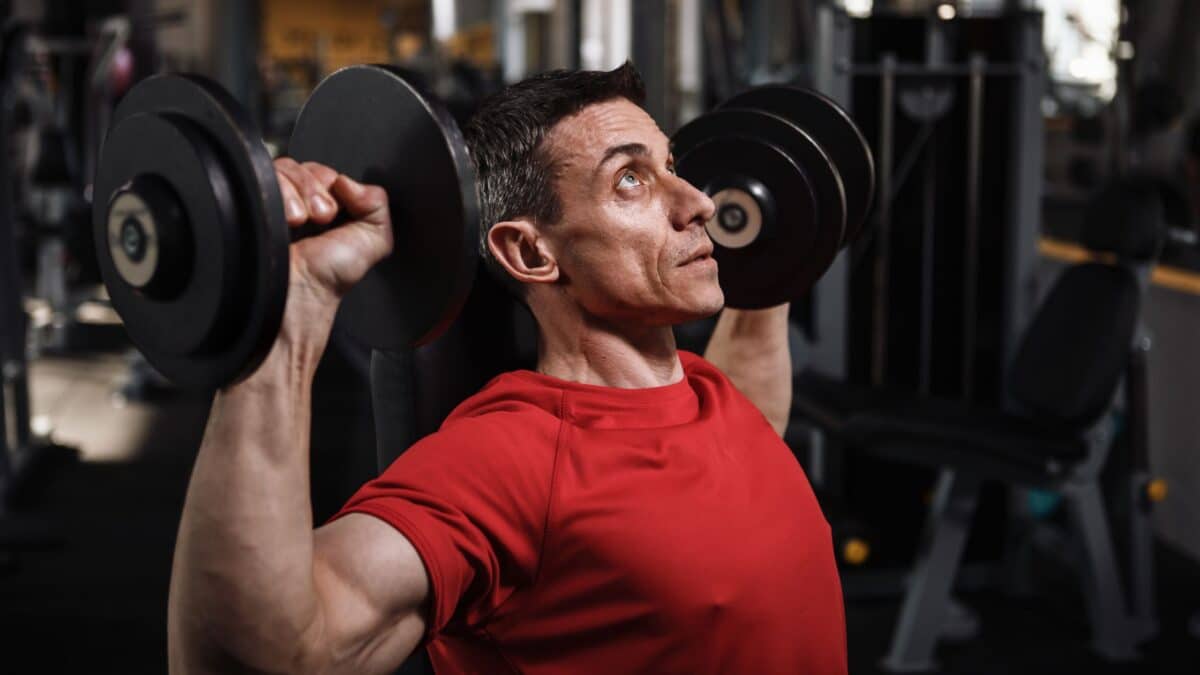
Une activité physique comme la musculation est porteuse de nombreux bienfaits 🛡️ pour la santé4 5 :
- Prévention des troubles cardiaques
- Régulation de la tension artérielle
- Maintien de la densité osseuse et prévention de l’ostéoporose
- Réduction du stress
- Amélioration de la confiance en soi
- Développement des fonctions cognitives et maintien de l’autonomie
Voici la marche à suivre pour vous lancer :
- Trouvez votre source de motivation : que voulez-vous améliorer dans votre physique ? Écrivez-le sur papier, et relisez-le chaque jour. Cela nourrira votre volonté et vous poussera à vous dépasser lors des jours plus difficiles.
- Faites un bilan réaliste : il est important de savoir où vous en êtes. Donnez-vous une évaluation honnête et, encore une fois, documentez-le. Prenez des photos de votre corps si vous le souhaitez.
- Déterminez des objectifs atteignables : fixez-vous des objectifs réalistes et spécifiques. Définissez ces objectifs avec des détails. Par exemple, vous souhaitez perdre 10 kilos en 6 mois.
- Définissez un plan d’entraînement : soyez réaliste quant à la planification de vos heures d’entraînement. Inutile de vouloir commencer par 5 séances hebdomadaires. Organisez-vous pour vous mettre en situation de réussite. Votre programme doit être complet et réalisable. N’hésitez pas à vous inspirer de celui fourni dans cet article.
Conclusion
Il est tout à fait possible d’arriver à progresser en musculation après 40 ans. Mais pour avoir une silhouette harmonieuse, vous devrez vous focaliser sur l’essentiel, à savoir : un entraînement adapté, une excellente nutrition et une récupération optimale. 💤
Vous l’avez compris, la qualité de votre hygiène de vie conditionne vos résultats. Pour vous accompagner dans votre transformation, découvrez mon programme TOTAL REBORN spécialement conçu pour les hommes de plus de 40 ans.
N’attendez plus pour prendre soin de votre santé !
FAQ
Oui, il est tout à fait possible de prendre du muscle après 40 ans en adaptant son entraînement, sa nutrition et son hygiène de vie.
Le métabolisme ralentit, les niveaux de testostérone baissent et la récupération est plus lente, rendant la prise de muscle plus difficile mais pas impossible.
Favorisez les exercices contrôlés avec des charges modérées, privilégiez les machines pour réduire les risques et évitez les mouvements trop traumatisants comme le soulevé de terre lourd.
3 à 5 séances par semaine sont idéales, en laissant suffisamment de temps de récupération entre chaque entraînement.
Oui, 2 à 3 séances de cardio par semaine aident à maintenir un bon métabolisme et une bonne santé cardiovasculaire.
Augmentez votre apport en protéines, réduisez les glucides transformés, privilégiez les bonnes graisses et maintenez un léger surplus calorique si vous souhaitez prendre du muscle.
Oui, il n’y a pas d’âge pour commencer ! Un entraînement progressif et adapté permet d’obtenir d’excellents résultats à tout âge.
Notes et références
- Association Française d’Urologie. Déficit en testostérone : de nouvelles recommandations pour améliorer la prise en charge (2021). ↩︎
- Khatri M, Naughton RJ, Clifford T, Harper LD, Corr L. The effects of collagen peptide supplementation on body composition, collagen synthesis, and recovery from joint injury and exercise: a systematic review. Amino Acids. 2021 Oct;53(10):1493-1506. doi: 10.1007/s00726-021-03072-x. Epub 2021 Sep 7. PMID: 34491424; PMCID: PMC8521576. ↩︎
- Clark KL, Sebastianelli W, Flechsenhar KR, Aukermann DF, Meza F, Millard RL, Deitch JR, Sherbondy PS, Albert A. 24-Week study on the use of collagen hydrolysate as a dietary supplement in athletes with activity-related joint pain. Curr Med Res Opin. 2008 May;24(5):1485-96. doi: 10.1185/030079908×291967. Epub 2008 Apr 15. PMID: 18416885. ↩︎
- Seguin R, Nelson ME. The benefits of strength training for older adults. Am J Prev Med. 2003 Oct;25(3 Suppl 2):141-9. doi: 10.1016/s0749-3797(03)00177-6. PMID: 14552938. ↩︎
- Macera CA, Cavanaugh A, Bellettiere J. State of the Art Review: Physical Activity and Older Adults. Am J Lifestyle Med. 2016 Jun 23;11(1):42-57. doi: 10.1177/1559827615571897. PMID: 30202313; PMCID: PMC6124851. ↩︎


